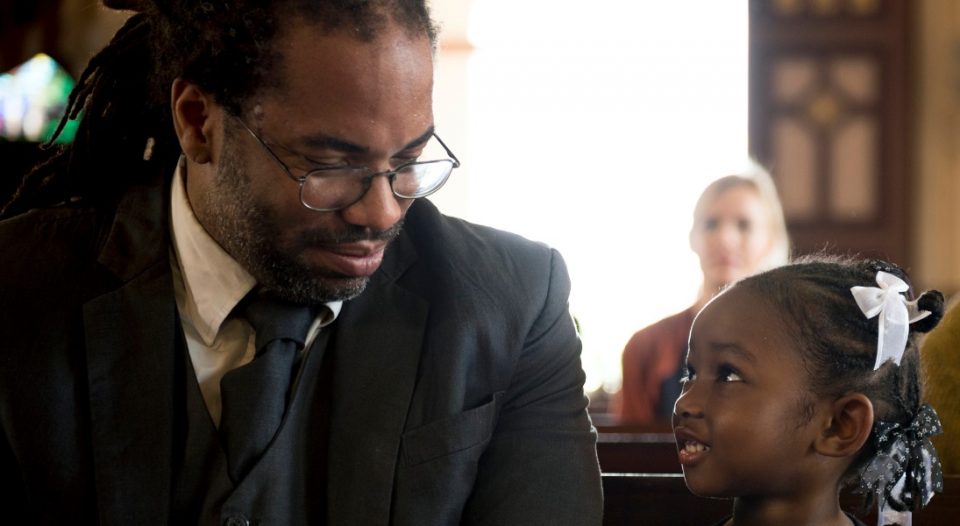Focal verse
“May the God of hope fill you with all joy and peace in believing, so that you may abound in hope by the power of the Holy Spirit” (Romans 15:13).
Reflection
From the kitchen, where I’m cleaning up the breakfast dishes, I hear the sliding of tiles and blocks. I peek my head around and see my son, Isaac, sitting on one leg with the other propped next to him, his head leaning on his knee, and his hands moving his train. He’s saying, “Coming through, I’ve got big, important things to do.”
I love watching Isaac play. Whether it’s building blocks, pushing his trains on the track or making a fort out of blankets, he refers to his activities as important—and he’s right. For our children, their play is significant work. It’s what shapes and forms them as people. It gives them meaning and connects them with others. Their play helps us deepen relationships with them.
While play is important work for children, going to church may or may not seem like work for us. The word liturgy originated in Greek and translates as “work for the people.” It’s what we do when we go to church—we work by singing, prayer, peace-making, communion-taking, and blessings. When I watch my children play, I’m reminded of the importance of the work we do through worship. Like play influences children, participating in the liturgy of the church shapes us as God’s people, gives us words to share our faith, and deepens our relationship with those with whom we worship.
Some weeks it’s easier to get our children to go to church than others. As parents it definitely feels like work attending church (whether in person or online) and wrangling our children week after week. But this is what we’re called to do: to show up as we are and allow God to work in us as we do the work of praying, singing and worshipping. I believe the sheer act of engaging in worship—whether we’re tired, stressed joyful, or doubting—forms each of us, young and old.
Teaching our kids about the liturgy can happen when we let the words of worship work in us. When we attend services and listen. When we take our bulletins home and use the pieces of worship as prayers and readings for family devotions. When we bless one another. When we share peace through asking and receiving forgiveness. When we share meals with friends and family. These are all ways we work as God’s people and practice living the liturgy.
This month take some time as a family to give thanks for the liturgy in worship. Talk about what certain words mean with your children or look up where pieces of the liturgy can be found in scripture. Practice certain phrases at home so your children can respond in worship. Liturgy isn’t only meant to be experienced in church. How can you help your children see how all the work they do is a way to give thanks to God?
Practices
- A great book for adults to see how liturgy can shape our every day is Tish Harrison Warren’s Liturgy of the Ordinary (IVP; 2016). Read it and see how you can incorporate some of the lessons in your family life.
- Take a piece of your church’s liturgy and say it together at a certain time of day. In the morning tell everyone, “The Lord be with you.” When you get ready to leave the house for the day give each other a blessing, “May the Lord bless you and keep you.”
- Write out the words of the doxology (Praise God for whom all blessings flow, praise God all creatures here below, Praise him above ye heavenly hosts, praise Father, Son, and Holy Ghost. Amen) and post them someplace where everyone can see them. Before meals, at bedtime or when you leave the house, recite them together.
Prayers
We pray for schools and all who share in the calling to teach.
We pray for preschool teachers and daycare workers who love and care for our children.
We pray for children who know the value of play and share their joy with the world.
We give thanks for gathering weekly to hear God’s words of hope and peace.
We give thanks for puzzles, games, toys and playgrounds.
We give thanks for worship leaders and musicians who lead the church’s liturgy.
Lord, in your mercy, hear our prayer.
Amen.
Service opportunity
As the school year winds down, why not send love and thanks to the teachers in your life? Give thanks to your child(ren)’s teachers and schools for showing up, whether in person or virtually, to live out their callings and holy work. Sunday school teachers or coaches count, too. Send thank you notes, buy donuts and coffee or purchase a gift card to a local restaurant to share your support.






